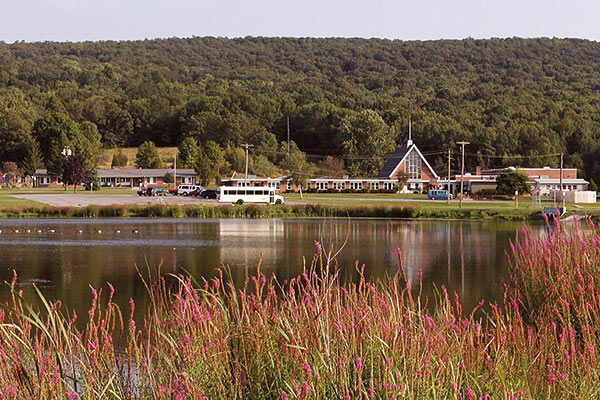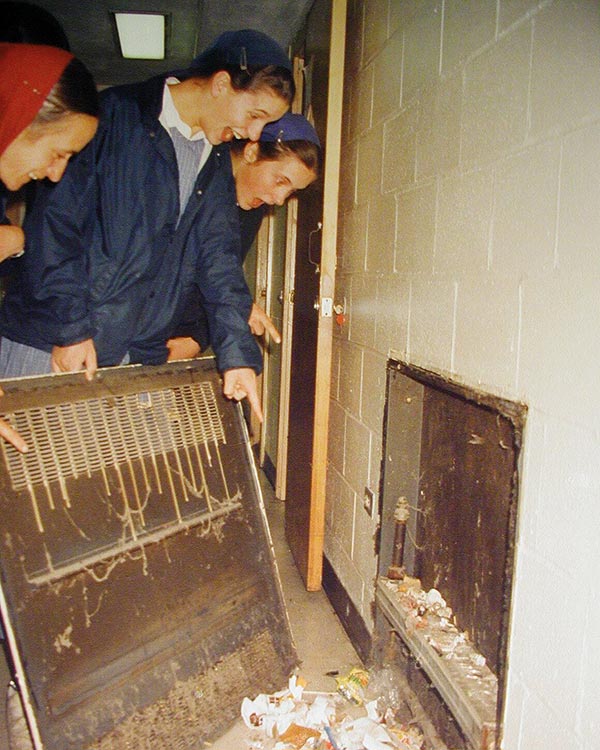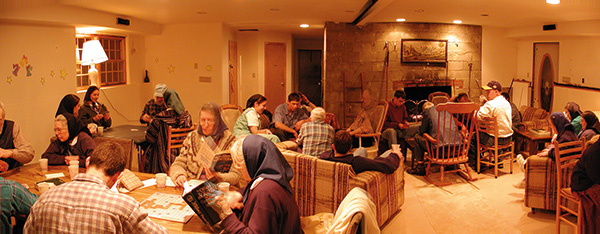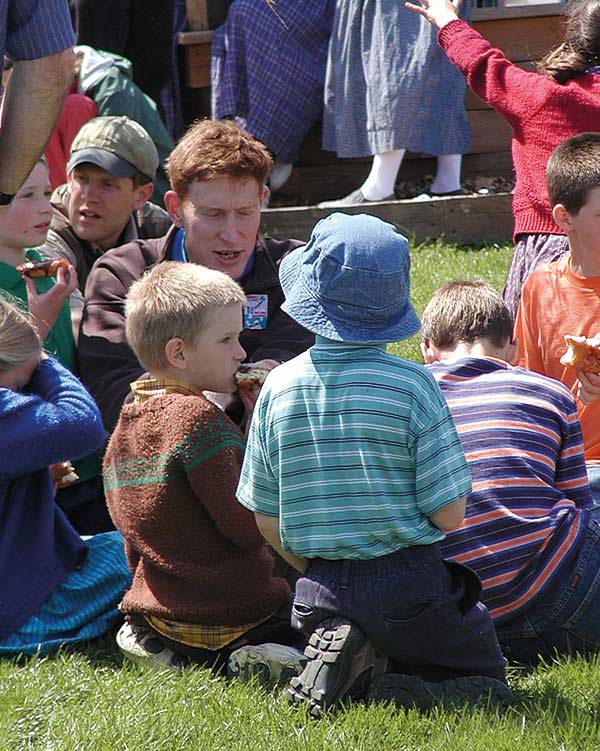Subtotal: $
Checkout-

Peter Waldo, the First Protestant?
-

The Artificial Pancreas
-

From Scrolls to Scrolling in Synagogue
-

Computers Can’t Do Math
-

The Tech of Prison Parenting
-

Will There Be an AI Apocalypse?
-

Taming Tech in Community
-

Tech Cities of the Bible
-

Send Us Your Surplus
-

Masters of Our Tools
-

ChatGPT Goes to Church
-

God’s Grandeur: A Poetry Comic
-

Who Gets to Tell the Story?
-

A Church in Ukraine Spreads Hope in Wartime
-

Editors’ Picks: The Genesis of Gender
-

Readers Respond
-

Loving the University
-

Locals Know Best
-

Gerhard Lohfink: Champion of Community

When a Bruderhof Is Born
What’s it like to be a young person in a young community?
By Maureen Swinger
July 20, 2024
Available languages: Deutsch
Next Article:
Explore Other Articles:
Occasionally, friends have asked how new Bruderhof communities begin. The short (and possibly unsatisfying) answer is that each one has its own story. I can only tell the story of the one I got to witness firsthand.
A one-and-a-half-hour drive north of New York City, in Chester, New York, lies the Bellvale campus. The property became a Bruderhof in 2001, but it came with a history. Below the ridge of Bellvale Mountain, a sprawling main building with a graceful A-frame chapel and three identical brick cottages run in a line across the valley, fronted by a sixteen-acre lake.
It started out as a welcoming place in the early 1960s, when Pius XII Youth and Family Services opened its doors to wards of the state, young men who had no other safe home. Run by the Holy Cross brothers, this boarding school provided education, stability, and care to hundreds of young men for the next thirty years. We know this firsthand because in our first ten years of residency there, we hosted reunions for Pius XII alumni and they came back in droves, transforming on arrival from dignified lawyers, architects, and chiropractors to gregarious teens who tore around campus finding their old rooms and favorite fishing spots. Under a willow on the far side of the lake, they stopped to salute the memorial stone of the first of them to fall in Vietnam – Eugene Kirkland, May 6, 1968.

The Pius XII Campus, now Bellvale, in August 2002 – one year after it became a Bruderhof. All photography by Tim Clement. Used by permission.
These men told of the love and high expectations showed them by the brothers, of the camaraderie they found. They were in touch with each other still, and acted like family. They declared the property as beautiful as it had ever been, and decried the fact that they had only been allowed to gaze at it from the main road for the last decade.
Why couldn’t they enter? By the early eighties, just as some of the most dedicated Holy Cross brothers were aging out, the New York courts began referring kids with criminal records to Pius XII. With very few brothers left to run the place, and increasingly violent teens being shipped from juvenile centers each week, Pius XII had to hire staff who doubled as security guards.
Neighbors complained of vandalism and threats to safety; police were frequently called in to address fights or runaways or property damage. With so many troubled kids, a shortage of trained staff, and no funding to expand resources and repair the campus, Pius XII managers abruptly declared the school defunct in May 2000.
The campus sat empty for a year; the only activity that Bruderhof scouts encountered was generated by rats still hanging around the dumpsters out back, and feral cats prowling about on account of the rats.

Investigating a faulty heater in the main building.
The scouts were looking for a place that would not have to be built from the ground up – preferably a former school or monastery that could take about a hundred people within a few months. The oldest US Bruderhof, Woodcrest, in Rifton, New York, was supporting more people than it ever had, and community members were considering the idea of moving the Community Playthings administrative offices and all connected families and singles to a new location. (Community Playthings is a Bruderhof company that supplies wooden furniture and toys for childcare centers.)
This proposal was met with enthusiasm by the families involved. When the first photos of our future home were posted, catching the outlines of the buildings, the mountains, and the lake, we all agreed it looked beautiful from the road. But the scout team also reported its state of dereliction. To my mind, and to many others’, this increased the appeal. How often do settled office workers in a well-established community get to try their hands at pioneering?
In July 2001, the first six people arrived, clearing and cleaning the rooms in the furthest cottage, getting one kitchen and two dorm-style bathrooms up and running, removing the worst piles of detritus, and turning hayfields back into something like lawns.
My office – tech support and help desk – moved in October. With one family and two singles, we brought the total population up to twenty. After scrubbing down our own office in the main building, we plugged in the computers and phones. We two single ladies plopped mattresses down in a room in the middle cottage. The cottages were all the same, sporting three desks built into cubbies in the wall, three metal stools, each chained to a desk, and three closets, identical except for the gang graffiti scrawled on the doors. (My roommate was apparently assigned to the Kings, and I to the Bloods.) The windows were shatterproof and also viewproof Plexiglas, with steel grates on the outside.
We pried off the grates with a crowbar, but the windows were screwed shut. I tracked down an electric screwdriver and freed up the window frame, only to have the top half slide down at guillotine speed and pulverize my knuckles before I could react. My bid for sympathy was met with laughter from older pioneers – it seems this accident had happened to multiple other seekers of fresh air, and had become a rite of passage.
Keeping an office headquarters humming so that distant factories didn’t experience a lag in service, while also tackling various corners of our wonderful, sprawling, messy new home, proved a rousing exercise in balance. The flair and fun of winging it, and sometimes blundering in the attempt, and apologizing, and taking another run at it, was exhilarating. Over the next weeks, more young singles arrived, sent from other communities to help conquer the place.

Using physics – and manpower – to move a rock out of the future cemetery.
I had been an introvert in my last home; the community was large and the youth group comprised about fifty people who had known each other most of their lives. I was also trying to let go of a wonderful friendship. Maybe we both had hoped for more, but it ended in distance and silence. I came to Bellvale ready to put my head down and work, but probably skip the socializing.
That’s not how it ended up. This youth group, soon numbering around twenty, was thrown together so haphazardly into common purpose as we tackled dysfunction and grunge that it was impossible to be a wallflower. We got to know each other while running late-night cleaning projects, chipping graffiti off the walls, hurling rocks to knock pairs of old high-tops off the telephone lines, and dismantling the twelve-foot-high perimeter fence.
Between work projects, we found opportunities for downtime, and here the old campus was in our favor. Each of the three residential cottages had a big, central foyer, complete with fireplace and a circle of sofas. In the evenings, all you had to do was stroll the path fronting the cottages and pick your entertainment via the picture windows. In one foyer, an earnest political discussion. The next, a boisterous sing-along session. The last, an intense poker game. Folks mixed easily between houses, and lines between age groups, or families versus singles, were happily blurred.
There was more laughter in that first year than in most of our lives before or since. Bizarre situations arose daily. One morning someone opened an electrical panel in the main house basement and found a mummified cat. He put it in a shipping box and addressed it to his uncle, a prankster himself, who reacted not at all when opening the box, but made the most of others’ reactions as he showed his “gift” around at snack break.
Someone else put his head through a newly replaced window. It was a normal, clear glass window, but we were all so used to the clouded, scratched reform-school specials that he assumed his ability to see through it meant it was open. After getting stitched up, he reported his blunder at communal lunch. We couldn’t help laughing along with him.

A winter evening of Scrabble and cards for old and young.
An intrepid sewer-plant investigator found a disgusting pair of neon-orange plastic overalls. From then on, by unspoken agreement, those pants appeared in every Saturday-night skit, part of our weekly chance to cut loose and laugh over recent efforts and setbacks.
Our evening meetings were often lively discussions as to what was the right way forward, or the most important project out of the many clamoring for attention. There were disagreements and misunderstandings. But we gained new appreciation for our century-old community rule for direct speaking, with no gossip or undermining of others.
No one could forget Bellvale’s first Christmas. Many of the trappings and traditions accessible in a more settled community were simply not there. The teens joined the youth group in a simple interpretation of the Christmas story, as Joseph and Mary knocked at the seven different doors opening into our dining hall, and were turned away by various modern-day innkeepers, from an argumentative church auxiliary meeting to an elegant hotel concierge to a representation of our own community, too busy trying to fix and clean and build to welcome in the strangers. The young couple found refuge in a room behind a rowdy bar, as each of the formerly busy or proud innkeepers felt convicted of their blindness and turned up belatedly to worship the baby king. By the end, our whole community had gathered before the child.
It took almost a year till the Community Playthings office was fully staffed, in addition to the teachers, chefs, medical personnel, and everyone else needed to keep a Bruderhof running. We now had a functional dining hall, communal laundry, school classrooms, and a garage. A feisty grandma by the name of Sibyl joined us, declaring that her purpose in moving there was to give us a chance to start a cemetery. (She proceeded to live – gleefully – for another twelve years.) Now we had all generations represented, from grandparents down to one new baby.
Traditionally, singles on a Bruderhof join up with a particular family for weekends or holidays. I was very lucky to land with Milton and Sandy, who had raised a large family and been blessed with many grandchildren, most of whom resided elsewhere. The one daughter at home, Lisa, who was born with Down syndrome, was in her late thirties at the time. They treated me like another daughter, and over the course of five years, Lisa and I certainly became sisters, tag-teaming on art projects or baking endeavors, and starting out each workday with an hour in the communal laundry, where I ran the industrial machines while she folded cloth diapers and kitchen aprons, both of us singing loudly over the churning of the washers.
One summer afternoon we were sauntering along the path together, watching a soccer game on the field below. We stopped to identify a goalie who was making saves and blocking shots with death-defying jumps and dives. We were highly entertained. Lisa informed me that this was Jason Swinger, who had just moved to Bellvale from the Fox Hill community. I had no inkling that the goalie and I would be getting married in four years.
Singles shared breakfast twice a week; at first the guys were chefs on Tuesday and the girls on Friday. It developed into a serious culinary competition, with people waking earlier and earlier, borrowing waffle irons from various families and snaking extension cords to the tables from every outlet in the dining hall, or hosting an omelet bar with all the trimmings. Unsure where this would end, or if our community budget could sustain it, we eventually called a truce and agreed to mix it up. Whoever wanted to cook would do so, while the others showed up to drink coffee and scribble silly messages on the menu board. We started hauling our breakfasts farther afield, like the winding boardwalk at the end of the lake, with everyone sitting cross-legged and passing the pancakes along the line. Once there was cake and coffee on top of the mountain.
Jason and I discovered that we both loved jam sessions, and often instigated fireside sing-alongs that boomeranged from rock to country to folk and back again till midnight, or until some poor exhausted mother stuck her head into the foyer and shut us down. Sometimes we drifted into the acoustically exquisite chapel, a room that makes any singer sound good.
Bellvale hosted a youth conference in 2004, with hundreds of young people camping on the fields and discussing visions for the future of the Bruderhof. Many had been wishing for a way to try out the concept of small urban community houses. This inspiration gained footing and soon after, Bruderhof houses did start up in several cities in the northeast. The groundwork for this idea was laid by Justin Peters, an energetic design engineer, landscaper, and father, who had been bringing up the concept in meetings for years. He was also the one helping harness the power of the conference youth into a work team to landscape our community’s future cemetery, plant a circle of trees inside, and build a low stone wall around the grounds.
Just two months later, Justin drove to a nearby event with other Bellvale members, many of them from our youth group, to hear a talk on peace strategies for ending the Iraq War. As he walked toward the entrance, pointing out the striking beauty of a line of columnar oaks, he dropped to the sidewalk with no warning, suffering a fatal heart attack.
After an urgent phone call, those of us at home quickly assembled to pray for his life, unaware that he was already gone. His wife, Linda, went directly to the hospital, but his daughter was in our gathering when the second phone call came. Our hearts broke together as we realized that a man who had been a part of all our lives, whom we had worked alongside, argued and laughed and sung with, was not coming back. One hour before, he had walked past some of us planting shrubs around the front of the main building, thanked us for the work, and offered placement suggestions. How come we didn’t know to say goodbye?
That night, as we lined the driveway holding candles while his body was carried home, our close community was united in a new way, through silent shock and pain. The suddenness of his death was shattering. It also opened up a space for us all to remember why we were here, on this small, beautiful corner of the earth: not to build up a perfect, pretty community but to attest to a way of life shown us in the Gospels.

Justin Peters tells a story to some of the school kids.
Justin’s was the first grave in the cemetery we had built with him. When I walk through that gate now, I don’t think of his death, or those of the other nine now buried there. I think of the way they believed in the truth of a shared life, for a greater purpose than community itself. Robert Frost captured that duality in the final lines of “Two Tramps in Mud Time”:
But yield who will to their separation,
My object in living is to unite
My avocation and my vocation
As my two eyes make one in sight.
Only where love and need are one,
And the work is play for mortal stakes,
Is the deed ever really done
For Heaven and the future’s sakes.
Two decades on, most of those first hundred residents of Bellvale have moved along to other communities and stages of life. But, just like our Pius XII predecessors on the same campus, when we are reunited all the stories surface again. People start to laugh and relive the work and the craziness and the joy. And someone will always remember Justin. We’ve reached the point now where our children can tell the stories on our behalf. That’s just fine with us, until they in turn get the chance to be part of their own new community.
Already a subscriber? Sign in
Try 3 months of unlimited access. Start your FREE TRIAL today. Cancel anytime.






























Peggy Ellsberg
I just loved Maureen Swinger's piece on Starting a Bruderhof Community. Swinger always writes with such vivid detail and brightens everything she says with good humor and resilience. The courage and sense of adventure that she has brought to this memoir of carrying the torch of Christian community are inspirational to readers like me.
Mark Vanskiver
Such a wonderful remembrance of life in community. Thank you, Maureen for sharing. Mark VanSkiver